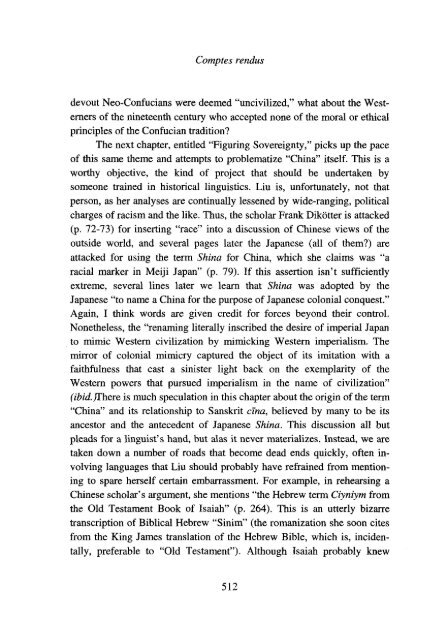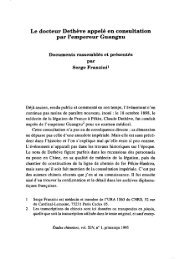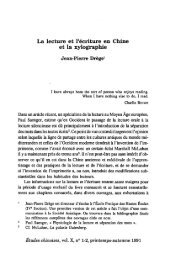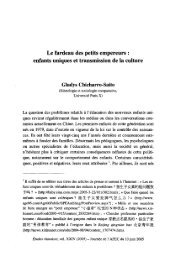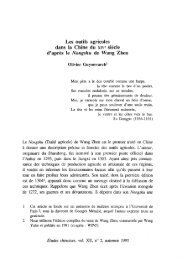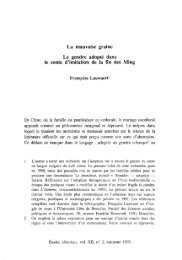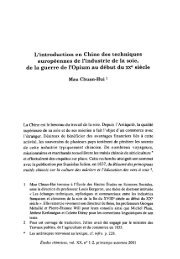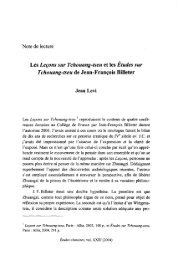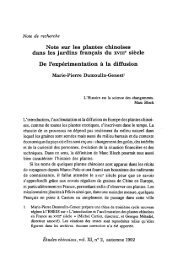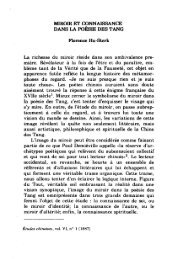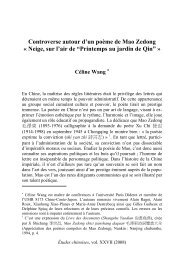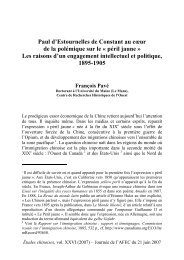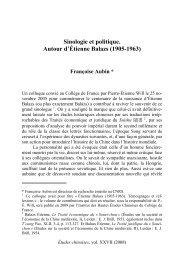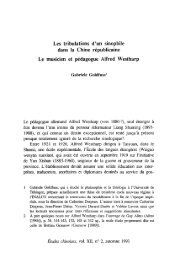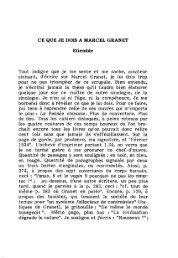You also want an ePaper? Increase the reach of your titles
YUMPU automatically turns print PDFs into web optimized ePapers that Google loves.
Comptes rendus<br />
devout Neo-Confucians were deemed "uncivilized," what about the Westerners<br />
of the nineteenth century who accepted none of the moral or ethical<br />
principles of the Confucian tradition?<br />
The next chapter, entitled "Figuring Sovereignty," picks up the pace<br />
of this same thème and attempts to problematize "China" itself. This is a<br />
worthy objective, the kind of project that should be undertaken by<br />
someone trained in historical linguistics. Liu is, unfortunately, not that<br />
person, as her analyses are continually lessened by wide-ranging, political<br />
charges of racism and the like. Thus, the scholar Frank Dikotter is attacked<br />
(p. 72-73) for inserting "race" into a discussion of Chinese views of the<br />
outside world, and several pages later the Japanese (ail of them?) are<br />
attacked for using the term Shina for China, which she claims was "a<br />
racial marker in Meiji Japan" (p. 79). If this assertion isn't sufficiently<br />
extrême, several lines later we learn that Shina was adopted by the<br />
Japanese "to name a China for the purpose of Japanese colonial conquest."<br />
Again, I think words are given crédit for forces beyond their control.<br />
Nonetheless, the "renaming literally inscribed the désire of impérial Japan<br />
to mimic Western civilization by mimicking Western imperialism. The<br />
mirror of colonial mimicry captured the object of its imitation with a<br />
faithfulness that cast a sinister light back on the exemplarity of the<br />
Western powers that pursued imperialism in the name of civilization"<br />
(ibid.JThere is much spéculation in this chapter about the origin of the term<br />
"China" and its relationship to Sanskrit cïna, believed by many to be its<br />
ancestor and the antécédent of Japanese Shina. This discussion ail but<br />
pleads for a linguist's hand, but alas it never materializes. Instead, we are<br />
taken down a number of roads that become dead ends quickly, often involving<br />
languages that Liu should probably hâve refrained from mentioning<br />
to spare herself certain embarrassment. For example, in rehearsing a<br />
Chinese scholar's argument, she mentions "the Hebrew term Ciyniym from<br />
the Old Testament Book of Isaiah" (p. 264). This is an utterly bizarre<br />
transcription of Biblical Hebrew "Sinim" (the romanization she soon cites<br />
from the King James translation of the Hebrew Bible, which is, incidentally,<br />
préférable to "Old Testament"). Although Isaiah probably knew<br />
512


